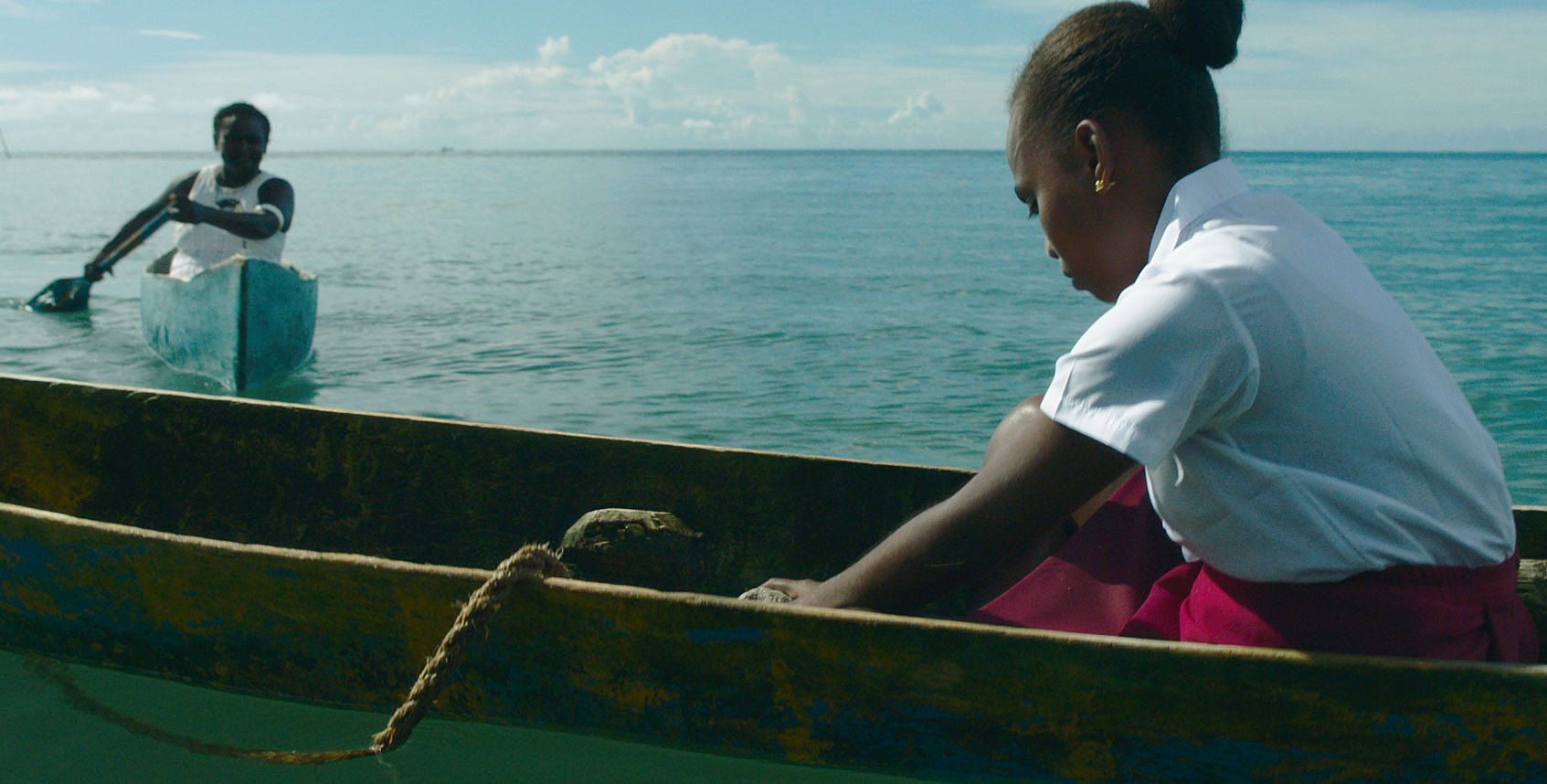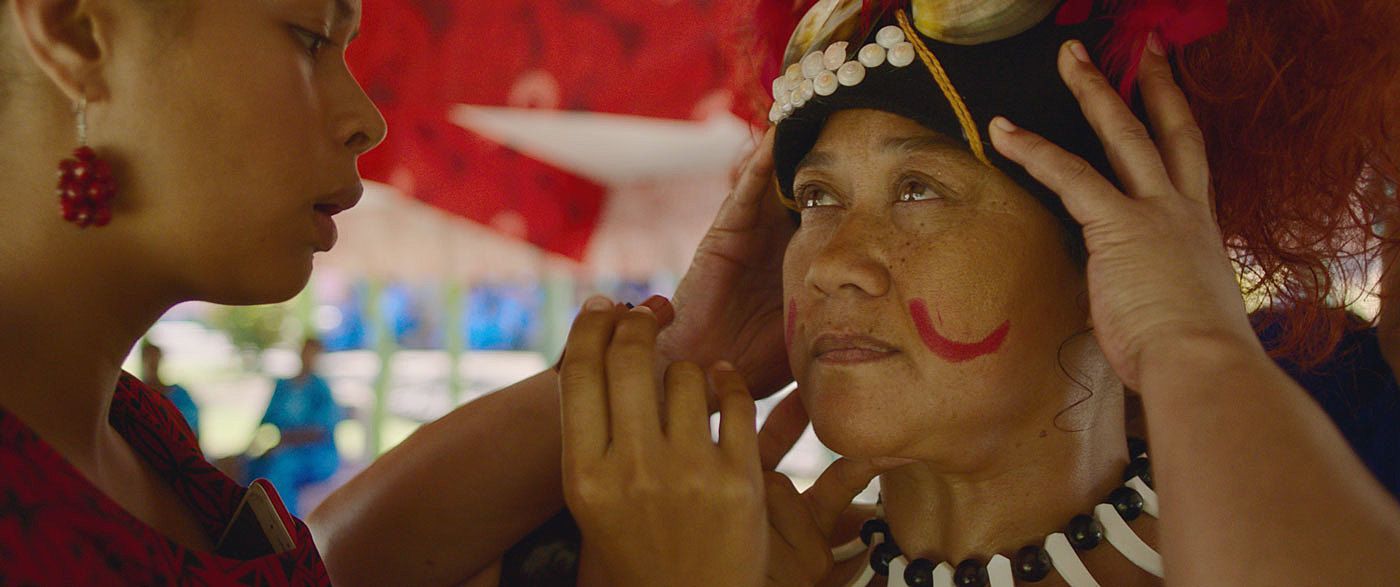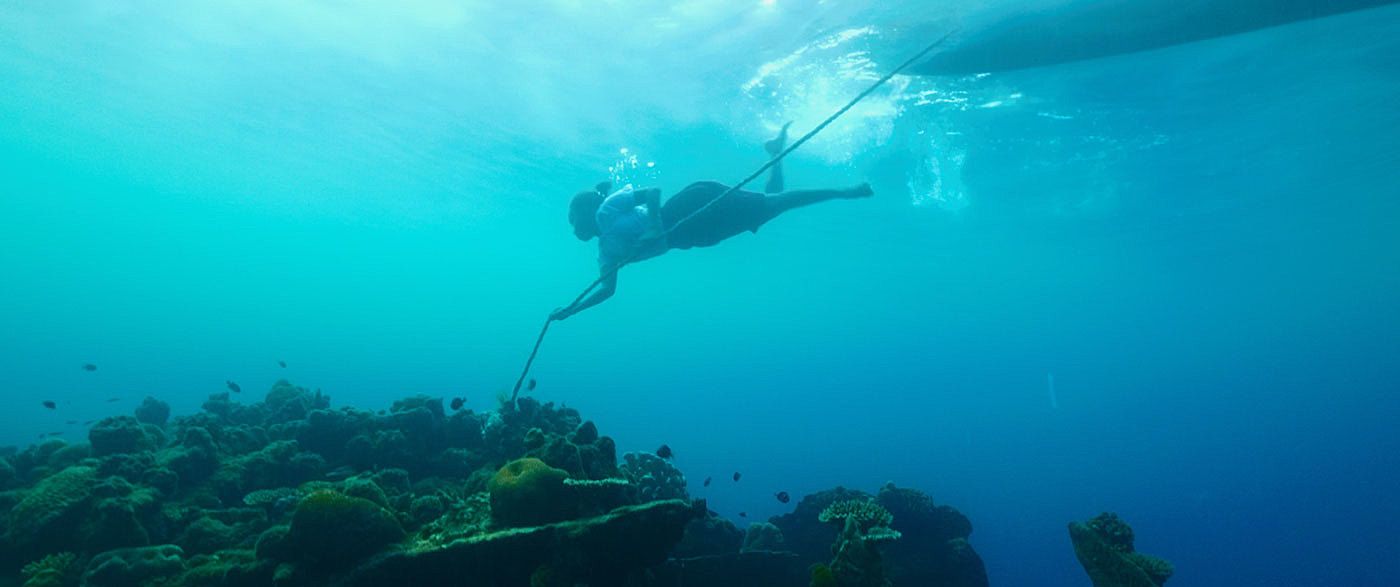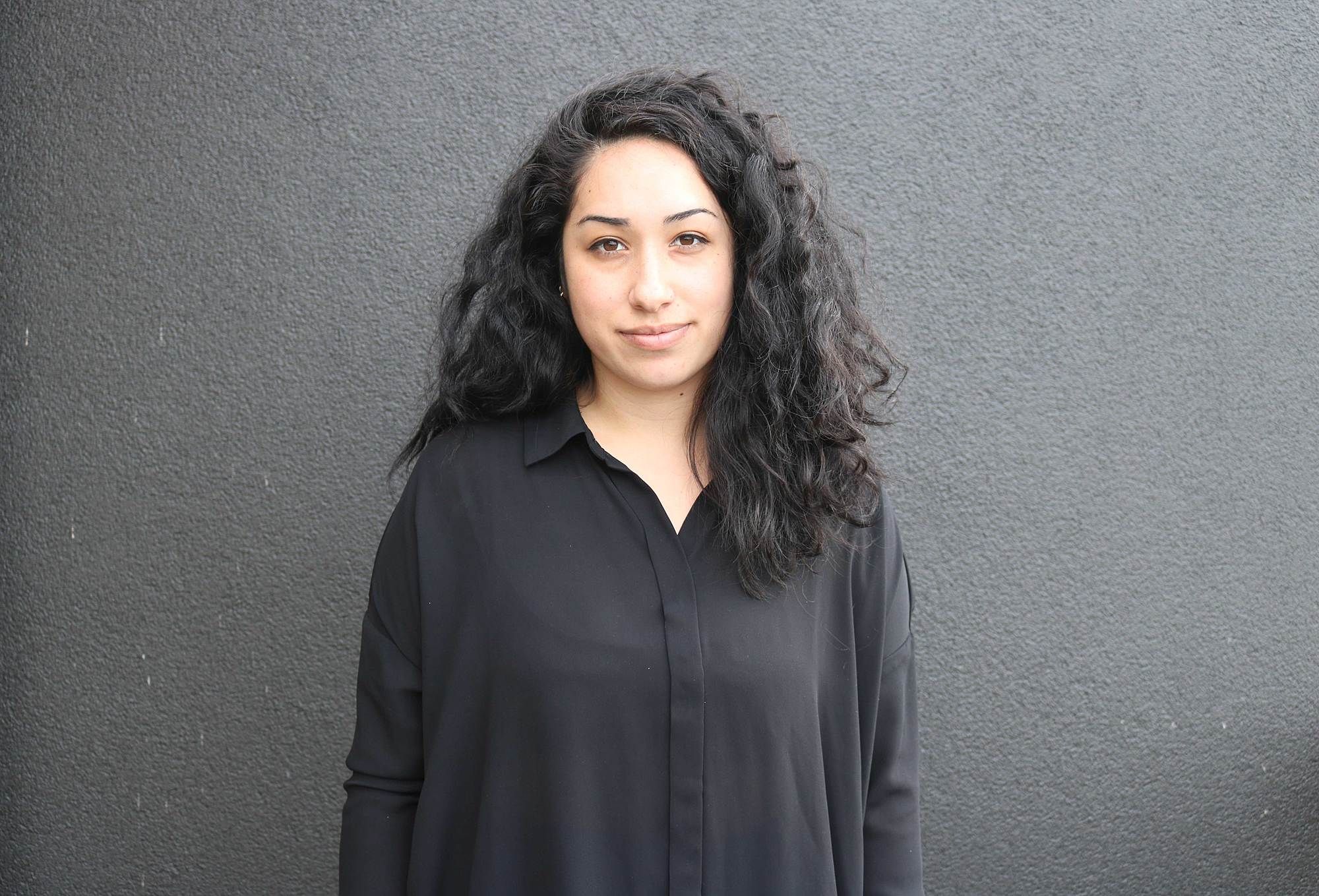Moving on from Disney’s Moana: The broader portrayal of women in Vai
Following the success of Waru, Lana Lopesi talks strength, shorthand and home with two of the writer-directors behind the highly anticipated film Vai.
Following the success of Waru, Lana Lopesi talks strength, shorthand and home with two of the writer-directors behind the highly anticipated film Vai.
“No other people have had their history shaped so much by an ocean.”
— Teresia K Teaiwa
Across Te Moana Nui a Kiwa, the ocean means different things. For some it acts as a means of sustenance, others a passage for travel, and for those who have felt its harshest fury, it’s an all-knowing force not to be messed with. The ocean, for many Pacific people, is a central tenet of Pacific life, worldviews and identities. In literature, art and film the ocean has acted, and continues to act, as a pertinent metaphor for how we talk about the contemporary experiences of Pacific people and connections between different island groups. Vai, a new feature film set for cinema release across the country this week continues the metaphor through its story of female empowerment.
Vai is brought together by the producer duo Kerry Warkia and Kiel McNaughton. Using the same model they used for the critically acclaimed Waru, Warkia and McNaughton assembled another team of writer/directors, this time nine Pacific women, to bring together Vai. Eight ten-minute-long vignettes are stitched together to bring to life the character of Vai. Spread across Fiji, Tonga, Solomon Islands, Kuki Airani, Sāmoa, Niue and Aotearoa, we follow Vai from a young girl to a grandmother.
Vai has hit the ground running, with international premieres at the Berlin International Film Festival and South by Southwest in Austin, Texas, followed by its Aotearoa premiere at the Māoriland Film Festival. Between this hectic schedule I managed to nab a conversation with two of the writer/directors, Matasila Freshwater and Marina Alofagia McCartney, where we chatted about insecurities, the shorthand between Pacific women and mums.
I straddle two worlds, I literally have one leg in one country and one in the other, and it is at times a challenging stretch…
Lana Lopesi: The film is located in many places across Te Moana Nui a Kiwa, so where is home for you both?
Marina Alofagia McCartney: That [the idea of home] is something which is familiar but not at the same time. I always say that I am a New Zealand-born Sāmoan Geordie. My mum is from Sāmoa and my dad is from Newcastle, England, and I describe myself that way because if I didn’t I wouldn’t be acknowledging how their worldviews have shaped me. But at the same time, and I think you’ve actually said this before Lana, you’re a daughter of the diaspora, and that is certainly me. I straddle two worlds, I literally have one leg in one country and one in the other, and it is at times a challenging stretch…
LL: Testing your flexibility?
MAM: Yes, testing your flexibility – and I’m not that flexible. Both of these places feel like home and yet there are times when they aren’t. Because of my mixed heritage there are times where I feel like I am not quite either, depending who I’m talking to, depending on who says things like, “I’m not sure if you know that much about Sāmoan culture,” or when you’re not necessarily seen as being white either.
Home is a complicated issue, but home is where my family is.
Matasila Freshwater: I agree. I completely agree about feeling displaced about home as well. My mother is from the Solomon Islands, my dad is from England, I was born in New Zealand. So, I definitely feel between worlds and in the space between, you know? And we sort of build home based on the narratives our parents have told us about those places. It’s so hard to get back to the Solomons, we don’t have a super strong infrastructure and we don’t have tourist money like the other islands, so going home has always been at these six-to-ten-year intervals. So that’s my existence, sitting in both and not fitting into either, and we’re reminded by all groups.
I am embraced beautifully by my Solomon Islands family. But you know we’ll go paddling somewhere to a nice place to swim and there will be some little kids that say, “There’s the white girl” and I’m like, “No I’m not the white girl.” And then they’re like, “You’re not really white, you’re red,” and I’m like, okay, I’ll have to take that.
But you know these are the conversations that we’re always having and it’s a constant question of What is my identity, who am I?
MAM: That’s so true Mata, I was just thinking about going back to my village, and yeah there is the “Palagi…Palagi…Palagi” but when I’m in my own house in my village, with my own relatives I feel at home.
But you know what I find really interesting? Neither of us talked about England as being home.
MF: I know.
MAM: We talk about straddling two worlds, meaning New Zealand. I wonder if we lump England and New Zealand together, I don’t know.
MF: I think I do, because the structures seem the same, and they’re the predominant power.
LL: Let’s dive into the film quickly, how did you both become involved in Vai?
MF: I feel like I got involved quite late in the process, but I got an email from Kerry to apply through their system and I remember they didn’t have a tick box for Solomon Islands, just Papua New Guinea, so I just clicked New Zealand. When I emailed her about it, she replied like, “OMG there should have been PNG/Solomons, I’m so sorry,” and then from there we had a conversation.
I knew about Waru, and had seen it and thought that was such an important piece to come out of Aotearoa. So I was really excited and frankly fucking terrified to be onboard with this. But scary things are often good things.
I felt so secure with Kerry. It’s a shorthand, it’s been such a shorthand working with these women, in contrast to other places in the film industry where I feel I have to explain, or not, a lot about prejudice or assumptions or blatant racism, so that made me feel comfortable with how harmonious this experience turned out to be.
MAM: That word shorthand is such a fantastic way of describing what happens when you’re in this space. It’s just not as exhausting as it usually would be when you’re outside of that framework. I’m with you Mata, I felt incredibly secure, culturally. I didn’t feel as though I had to explain myself with particular things, the burden wasn’t on me to educate. I was thinking even at South by Southwest, and there were four of us at a bar, and we sat there and our conversation ended up delving really deeply into spiritual experiences and that type of thing. If we were sitting in a Palagi context, they’d just be thinking what are these fruitcakes going on about, but we didn’t have to explain, we just got it. And that’s kind of what the process of Vai has been like. I’m with you Mata.
So, they shoulder-tapped up to 70 filmmakers and asked us to apply. We got into a shortlist and had a conversation with Kerry and then we were [each] told that we were one of the nine to get in. We weren’t told who each other were until about two days before a writing retreat, so we both turned up at the wharf, and as soon as you see another Pacific female you would think – is that another, oh no that’s just another Pacific person at the wharf going to Waiheke – brown people go to Waiheke too.
We are multilayered people and can tell stories in multilayered ways, including having multilayered narratives.
LL: So, tell me about this collective and collaborative process. This is the second time we audiences have got to see the results of this process now, but I think there’s still such a mystery around how it really works – how you work together or not, are they all separate or are you workshopping everything at the same time?
MAM: This way of making films taps into the collective nature of our cultures. It doesn’t mean it’s the only way for us to tell stories, but it’s just another way. We are multilayered people and can tell stories in multilayered ways, including having multilayered narratives. Just like any collective or community, we have our ups and downs, we are all different, but the thing that united us was this common goal to tell stories through a Moana female lens.
Working in this way meant that we delivered this feature film in such a crazy [turnaround] time, about seven months. We’re more than the sum of our own parts. When you work as a collective or as a community, the project just becomes bigger and stronger than any of our own weaknesses. I think it’s just a great example of what can happen when Māori and Pacific women get together, this is the strength of the Moana.
MF: Every production has its hardships, but we were all here fighting for the same thing, we were all here knowing that we needed to give space and have space and respect each other’s differences. We’ve had so many discussions beyond the film itself about ourselves and our worlds and our industry, and that’s added a real richness to how we talk about the film. Even when we were creating the film we were in constant talk; we unfortunately couldn’t go to each island to be there for each other, but we were in a constant dialogue, and I needed that. I needed to know that there were people that could give advice and hear me, and that’s a real credit to our producers because the foundation of Vai is about that connection.
LL: I guess the other thing that I’m thinking about as you are both talking is that while there are you nine and the producers, we all have communities of people behind us that are invisible when we’re making work, as well as those who aren’t with us anymore or are yet to come. That’s something that your individual vignette talks about Marina, are you able to share with us the thinking behind your piece?
MAM: It’s funny that you’ve ended up with both Mata and I, because both of our pieces allude to a world that is bigger than the tangible, and I guess it’s very much about knowing that our ancestors stand behind us everywhere we go in the world – whether there’s a group of them or it’s one at a time, they’re there. I was raised with that idea, with my mum saying your grandfather’s there or your nana’s with you. I’ve also seen my mother talk to photographs of her parents. I wanted to allude to the strength that knowing can have, it’s really important to me, especially if at any time I feel alone to remember that I’m not.
If we go back to Epeli Hau’ofa’s seminal essay where he [wrote about] the fact that our world was always bigger than the tangible, he looked beyond the land masses to the ocean as a connector but also beyond what we can see. Our world included the heavens and the afterlife. And for me it was really important to show that these precolonial spiritual beliefs still exist in this modern world, which tries to suppress our beliefs.
LL: What were the ideas that you were thinking about with your vignette, Mata?
MF: Just myself and my insecurities. I was definitely touching on that spiritual element – this idea that the world does exist beyond the tangible and that there’s a strength in that, that we need an rely on. My mum would say things like, “I just hung out the washing and had a chat to your granddad,” so it was never something to question because that was how Mum understood the world and how I understood the world. My piece is definitely about my sense of the in between. For myself there’s a specific inbetweenness that comes from being in between cultures, but for my character it’s her being on the precipice of choosing her path in life, of acknowledging her past and where she’s felt immense pain, she just needs a familiar face to kick her up the bum – as we all do at some stage.
LL: I was wondering, Mata, as a Sāmoan woman here in Aotearoa I always think about how much Sāmoans dominate the Pacific conversation and sometimes I think that we forget about the diversity within the ocean itself, so I was wondering if you had anything to offer in that space – how important was it have a Solomon Islands story in there?
MF: I totally hear you. I grew up not ever being included in Pasifika events at school because I was Melanesian, and then people would also be like, but are you even? I think we all feel like because we are in a colonial structure that we’re all fighting for space and maybe our mindset hasn’t quite shifted yet to understand that a success of someone who is like us is a success for us as well. So that’s how I felt about doing this project, that because of the success of Waru we were able to come in and do this, their wins and our wins, and hopefully it means that there will be more women after us making content and telling their own stories, which really excites me – I think that’s beautiful.
MAM: I do wonder – if our producer weren’t of Papua New Guinean descent, would the islands included have been different? I think that’s why what Kerry is doing is so important, because she is opening up this insular idea that some of us have on the Moana, to be more inclusive.
LL: We all see the ocean from our own vantage points as well, and Sāmoans like to think that we’re the centre of the earth – that’s what our creation stories tell us, too. I guess why I asked that question as well is because what I see is that we’re really lucky to be the generation of makers that we are now because we benefit from the work which has happened before us, but there are still really big issues like colourism that we aren’t talking about yet as a community. And I felt hopeful that having a vignette in there like yours, Mata, is going some way toward a more inclusive picture of the Pacific.
MF: I think you’re so right. When I was casting, which was a hard process in general because of internet access, my cousin had mentioned that lots of the girls they had put forward were half-caste – Brown girls. And I asked if that was because I’m a Brown girl, and she said it might be, but also it may be that they think that’s what is beautiful. That made me so angry. I knew it was my duty to have a Black girl on screen because that’s my mum, my cousins, my aunties.
It was interesting when we sat in on the test screenings and there were some voices that were like, “Oh, we forgot about the Solomons,” or, “Oh, we forgot that Aotearoa was a part of the Pacific,” which I thought was really crazy, but also really interesting.
LL: One of the things that stood out to me when I watched Vai was that most of the vignettes were filmed outside of Aotearoa, and most of the filmmakers are diasporic – so I was curious as to how you navigate that, and these ideas of home where these storylines might be constructed from a distance?
MAM: One of the things that we’ve tried to communicate is that while the film of the narrative is told through a Moana female lens, it is certainly not representative of every Moana female. We all have been raised in our own ways and my own worldview is going to be different to Mata’s, and so on, so those worldviews are going to shape all of our narratives, and the types of narratives that we decide to privilege. I will tell stories about belonging, not belonging, connection, disconnection, because that is my story – you know? The fact, too, that this film has come out of New Zealand affects the narrative that is told.
We were always orators and that’s how we connected, that’s a part of our worldview.
MF: I think it’s also that our experience is valid.
My mother is my cultural anchor and was the one who told me stories. We were always orators and that’s how we connected, that’s a part of our worldview and is deeply important to how we become people.
MAM: You’re right – our experiences are valid. I have no idea how to tackle the idea of our Moana sisters back in their islands wanting to tell their stories, because they need infrastructure to begin with, that we have here, and they don’t have there.
MF: If we contribute to having and wanting more diverse stories, then hopefully there will be a follow-on. It’s actually happening already with my cousin, who was brought on to help our locations manager and became our production coordinator on the ground, because she’s so amazing. She helped with the script, the costumes, locations, cast – everything – and she called me recently as was like, “Mata can send me a reference? Because I’m being called up by one of two productions that want me to work for them,” and I’m so here for this. She’s there and is now interested and wants to tell these stories, and if we can keep fostering stuff like that then I think that’s what’s really important.
LL: Vai is about the empowerment of women, so I wanted to know which women in your lives have empowered you both, and your journeys so far?
MAM: Certainly, my mum, and my step-mum. My mum was one of the strongest people I know and also was one of the most complicated, but man was she incredible when it came to fa’a Sāmoa and strength. Same thing with my step-mum as well, who is Cook Island. They both just get on with life because that’s what they have to do. I also think of my other aunties as well. My Aunty Pepe is just a really gracious, gentle woman, and I went to visit her after she went into hospital, and I told her a bit about the film and that there’s a piece of dialogue in there where the older aunty turns around and says to her niece – who was questioning her own ability to be Sāmoan – “It’s in your bones,” and my aunty said that to me about 20 years ago, and she was shocked that I still remembered it. That strength that’s in my bones, that’s in all of our bones and I look at all these women who go through life tackling these challenges that other women from other backgrounds don’t have to tackle, and they do so while trying constantly to keep their integrity intact. I think of my nana, and I also think of my dad’s mum. I think of my sisters and the different things they’ve had to endure – I wouldn’t want to stuff around with my sisters.
I’m proud to be a woman of Sāmoan and Geordie descent and to have a mother who was Sāmoan and a step-mother who is Cook Island, but I also celebrate my dad because he was also the type of person who gave space in order for his daughters to express that strength. He wasn’t threatened.
MF: Definitely my mum, she’s amazing and she’s batshit and she maintains the same level of enthusiasm for anything that I do. My sister Sumana, she’s always been super proud and supportive. But also, my dad.
I think of my family back home too, they’re all beautiful and generous. When they talk about me in terms of telling these stories, they’ve given me this name that they always called Mum, which means warrior. I just think that’s such a beautiful gift.
Vai is in cinemas now, for more information see their Facebook page.



